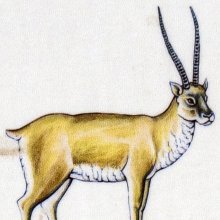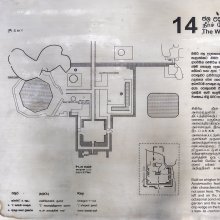Ciru: 10 definitions
Introduction:
Ciru means something in Hinduism, Sanskrit, Marathi, Tamil. If you want to know the exact meaning, history, etymology or English translation of this term then check out the descriptions on this page. Add your comment or reference to a book if you want to contribute to this summary article.
Alternative spellings of this word include Chiru.
Images (photo gallery)
Languages of India and abroad
Marathi-English dictionary
Source: DDSA: The Molesworth Marathi and English Dictionaryciru (चिरु).—f (cīra & ऊ) A large white louse fond of cloth.
Source: DDSA: The Aryabhusan school dictionary, Marathi-Englishcirū (चिरू).—f A louse fond of cloth.
Marathi is an Indo-European language having over 70 million native speakers people in (predominantly) Maharashtra India. Marathi, like many other Indo-Aryan languages, evolved from early forms of Prakrit, which itself is a subset of Sanskrit, one of the most ancient languages of the world.
Sanskrit dictionary
Source: DDSA: The practical Sanskrit-English dictionaryCiru (चिरु).—The shoulder-joint.
Derivable forms: ciruḥ (चिरुः).
Source: Cologne Digital Sanskrit Dictionaries: Shabda-Sagara Sanskrit-English DictionaryCiru (चिरु).—n. (-ru) The shoulder joint. E. cir to hurt, affix u; or cīyate-vāruk . bāhusandhau.
Source: Cologne Digital Sanskrit Dictionaries: Monier-Williams Sanskrit-English DictionaryCiru (चिरु):—m. the shoulder-joint, [cf. Lexicographers, esp. such as amarasiṃha, halāyudha, hemacandra, etc.]
Source: Cologne Digital Sanskrit Dictionaries: Yates Sanskrit-English DictionaryCiru (चिरु):—(ru) 2. n. The shoulder joint.
[Sanskrit to German]
Sanskrit, also spelled संस्कृतम् (saṃskṛtam), is an ancient language of India commonly seen as the grandmother of the Indo-European language family (even English!). Closely allied with Prakrit and Pali, Sanskrit is more exhaustive in both grammar and terms and has the most extensive collection of literature in the world, greatly surpassing its sister-languages Greek and Latin.
Kannada-English dictionary
Source: Alar: Kannada-English corpusCiru (ಚಿರು):—[adjective] (in comp.) small; little.
--- OR ---
Ciṟu (ಚಿಱು):—[adjective] (in comp.) small; little.
--- OR ---
Cīru (ಚೀರು):—[verb] to rub or scrape slightly, as with the fingernails, to relieve itching; to scratch.
--- OR ---
Cīru (ಚೀರು):—
1) [noun] a thin, sharp piece of wood; a splinter.
2) [noun] (gen.) a small piece of wood.
3) [noun] (fig.) anything retained (that gives pain, brings back unpleasant memories to the mind or causes compunction).
--- OR ---
Cīru (ಚೀರು):—
1) [verb] to cry aloud; to shout.
2) [verb] to scream.
--- OR ---
Cīru (ಚೀರು):—[noun] a thin layer of mud smeared (on the surface of a vessel etc.).
--- OR ---
Cīṟu (ಚೀಱು):—
1) [verb] to cry aloud; to shout.
2) [verb] to scream.
--- OR ---
Cīṟu (ಚೀಱು):—[noun] = ಚೀರು [ciru]4.
--- OR ---
Cīṟu (ಚೀಱು):—[noun] = ಚೀರು [ciru]2.
Kannada is a Dravidian language (as opposed to the Indo-European language family) mainly spoken in the southwestern region of India.
Tamil dictionary
Source: DDSA: University of Madras: Tamil LexiconCiru (சிரு) noun Shoulder-joint; தோட்பொருத்து. (யாழ்ப்பாணத்து மானிப்பாயகராதி) [thodporuthu. (yazhppanathu manippayagarathi)]
--- OR ---
Ciṟu (சிறு) [ciṟuttal] 11 intransitive verb < சிறு-மை. [siru-mai.] See சிறுகு- [sirugu-], 1. சிறுத்தசெலுவதனுளிருந்து [siruthaseluvathanulirunthu] (திருப்புகழ் [thiruppugazh] 227).
--- OR ---
Ciṟu (சிறு) [ciṟuttal] 11 transitive verb < செறு-. [seru-.] To hinder, resist; தடுத்தல். [thaduthal.] Nāñ.
--- OR ---
Cīṟu (சீறு) [cīṟu] [தல் [thal]] 5 verb [Kanarese, Malayalam: cīṟu.] intransitive
1. [Telugu: cīru.] To hiss, as a serpent; பாம்புமுதலியன சத்தத்துடன் வெகுளுதல். [pambumuthaliyana sathathudan veguluthal.]
2. To snort, as a horse; to sniff; குதிரை முதலியன மூச்செறிதல். [kuthirai muthaliyana mucherithal.] (W.)
3. To be infuriated, to swell with rage; மூர்க்கங் கொள்ளுதல். [murkkang kolluthal.]
4. To roar and blaze forth, as a flame; தீ முதலியன முழங்கியெரிதல். [thi muthaliyana muzhangiyerithal.] — transitive
1. To get angry with; கோபித்தல். சிறுபேரழைத்தனவுஞ் சீறி யருளாதே [kopithal. siruperazhaithanavugn siri yarulathe] (நாலாயிர திவ்யப்பிரபந்தம் திருப்பாவை [nalayira thivyappirapandam thiruppavai] 28).
2. To destroy; அழித்தல். எயில்கண் மூன்றுஞ் சீறு மெந்தைபிரான் [azhithal. eyilkan munrugn siru menthaipiran] (தேவாரம் [thevaram] 45, 2).
--- OR ---
Cīṟu (சீறு) noun < சீறு-. [siru-.] Anger; சீற்றம். சீறில் லான் [sirram. siril lan] (ஏலாதி [elathi], 34).
--- OR ---
Cīṟu (சீறு) [cīṟutal] 5 intransitive verb To hoot like an owl; கத்துதல். ஆந்தை சீறல் அறியும் பலன் [kathuthal. anthai siral ariyum palan] (கவுளிசா. [kavulisa.] 16).
Tamil is an ancient language of India from the Dravidian family spoken by roughly 250 million people mainly in southern India and Sri Lanka.
See also (Relevant definitions)
Starts with (+279): Cir-ulanki, Cir-ulatai, Ciru caranai, Ciru cavukku, Ciru ceruppati, Ciru kala, Ciru kalarva, Ciru kirai, Ciru pullati, Ciru punai-k-kali, Ciru takarai, Ciru tekku, Ciru-canalvirai, Ciru-cavukku, Ciru-cenkurali, Ciru-corruvilavu, Ciru-kakkaipatiniyar, Ciru-kattukoti, Ciru-kottaikarantai, Ciru-kuriiurai.
Ends with: Carcciru, Cinnanciru, Manciru, Muciru, Mukkucciru, Piciru, Viciru.
Full-text (+431): Chiru-illantai, Ciruvanam, Cirukaraiyan, Cirutulaci, Ciruputaiyan, Cirukatalati, Ciruvali, Cirukal, Cirukutal, Cirunaralai, Cirucol, Ven-cirukatuku, Ciruviral, Cirupatu, Ner-cirutali, Ciruvittam, Chiru dekku, Cirupillai, Chiru kuppinta, Chirukila chiru.
Relevant text
Search found 9 books and stories containing Ciru, Cirū, Ciṟu, Cīru, Cīṟu, Chiru, Siru, Seeru; (plurals include: Cirus, Cirūs, Ciṟus, Cīrus, Cīṟus, Chirus, Sirus, Seerus). You can also click to the full overview containing English textual excerpts. Below are direct links for the most relevant articles:
The Trials of Siru < [January 1967]
The Trials of Siru < [January 1967]
The Tamil Academy: A Myth < [November, 1928]
Puranic encyclopaedia (by Vettam Mani)
Tiruvaymoli (Thiruvaimozhi): English translation (by S. Satyamurthi Ayyangar)
Pasuram 6.9.10 < [Section 9 - Ninth Tiruvaymoli (Nir ay nilan ay)]
Pasuram 6.2.9 < [Section 2 - Second Tiruvaymoli (Min itai matavarkal)]
Pasuram 6.1.8 < [Section 1 - First Tiruvaymoli (Vaikal pun kalivay)]
Early Chola Temples (by S. R. Balasubrahmanyam)
Temples in Erumbur (Urumur) < [Chapter II - Temples of Parantaka I’s Time]
Temples in Tiruvorriyur < [Chapter II - Temples of Parantaka I’s Time]
Inscriptional References < [Chapter I - Parantaka I (Madirai-Konda Parakesari)]
The Religion and Philosophy of Tevaram (Thevaram) (by M. A. Dorai Rangaswamy)
Chapter 4.6 - (b) Symbology of Man (the deer) < [Volume 2 - Nampi Arurar and Mythology]
Chapter 94 - Thirumuruganpoondi or Tirumurukanpunti (Hymn 49) < [Volume 3.7 - Unto the last]
Nayanar 36: Siruthondar (Ciruttonta) < [Volume 4.1.1 - A comparative study of the Shaivite saints the Thiruthondathogai]
Later Chola Temples (by S. R. Balasubrahmanyam)
Appendix 2: Tiruvanakkoyil < [Chapter VIII - Temples of Rajaraja II’s Time]
Temples in Nidur < [Chapter II - Temples of Kulottunga I’s Time]
Temples in Pallavarayanpettai (Kulattur) < [Chapter VIII - Temples of Rajaraja II’s Time]
Related products





